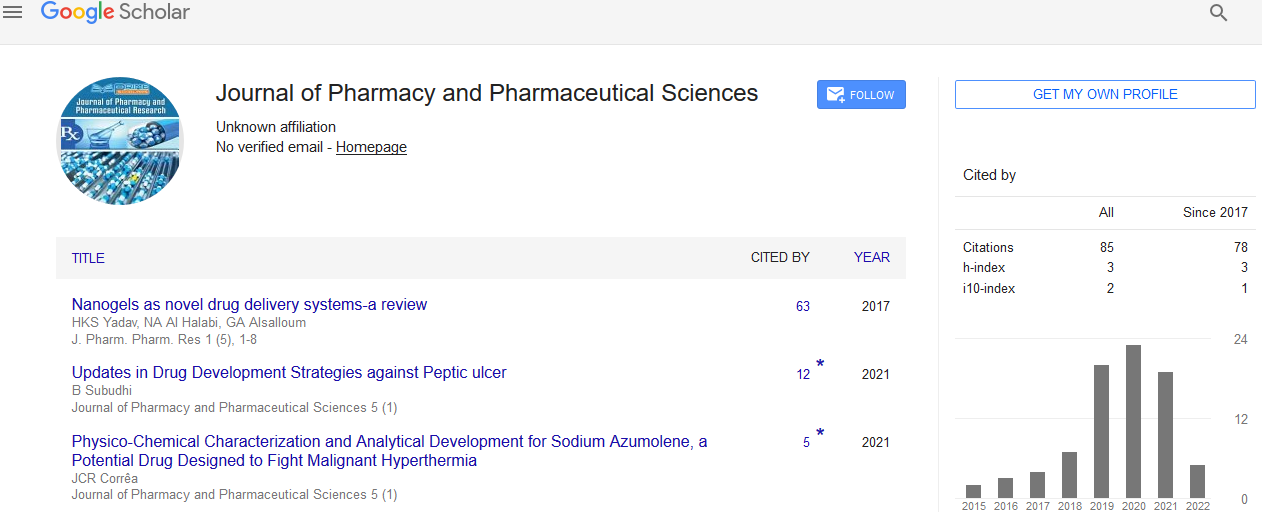Commentary - (2024) Volume 8, Issue 2
Advancements in Pharmaceutical Development: Pioneering the Future of Medicine
Merchant Micheal*
Department of Pharmaceutical Research, University of Queensland, Australia
*Correspondence:
Merchant Micheal,
Department of Pharmaceutical Research, University of Queensland,
Australia,
Email:
Received: 29-May-2024, Manuscript No. IPIPR-24-19960;
Editor assigned: 31-May-2024, Pre QC No. IPIPR-24-19960 (PQ);
Reviewed: 14-Jun-2024, QC No. IPIPR-24-19960;
Revised: 19-Jun-2024, Manuscript No. IPIPR-24-19960 (R);
, DOI: 10.21767/ipipr.8.02.019
Description
Pharmaceutical development stands as a cornerstone of
modern healthcare, driving innovation and therapeutic
breakthroughs that improve patient outcomes and quality of
life. The journey from drug discovery to market approval is a
multifaceted process that requires rigorous scientific inquiry,
regulatory compliance, and clinical validation. In recent years,
pharmaceutical development has witnessed remarkable
advancements, fuelled by technological innovation,
interdisciplinary collaboration, and a deepening understanding
of disease mechanisms. This article explores the latest trends
and innovations in pharmaceutical development, shedding
light on how these developments are shaping the future of
medicine. At the heart of pharmaceutical development lies
the process of drug discovery and design, where scientists
endeavour to identify and optimize novel therapeutic agents.
Traditional approaches, such as high-throughput screening and
structure-based drug design, have long been the mainstays
of this process. However, recent advances in computational
modelling, artificial intelligence, and machine learning have
revolutionized the way drugs are discovered and designed.
By leveraging big data analytics and predictive algorithms,
researchers can expedite the identification of lead compounds,
predict their pharmacokinetic properties, and optimize their
efficacy and safety profiles. This convergence of technology
and biology is accelerating the pace of drug discovery,
opening new avenues for targeting previously undruggable
diseases and molecular pathways. Formulation Development:
Formulation development plays a crucial role in ensuring the
efficacy, safety, and stability of pharmaceutical products. From
tablets and capsules to injectable and transdermal patches, the
formulation of a drug can significantly impact its bioavailability,
solubility, and therapeutic performance. In recent years, there
has been a growing emphasis on developing advanced drug
delivery systems that enhance drug targeting, minimize side
effects, and improve patient compliance. Nanotechnology, for
example, has enabled the design of nanoparticle-based carriers
that can deliver drugs to specific tissues or cells, bypassing
biological barriers and increasing therapeutic efficacy. Similarly,
advances in 3D printing technology have revolutionized the
production of personalized dosage forms, allowing for precise
control over drug release kinetics and dosing regimens. By
harnessing these innovative approaches, formulation scientists
are transforming the way drugs are delivered and administered,
ushering in a new era of precision medicine. The journey from
preclinical development to regulatory approval is arduous and
highly regulated, requiring extensive testing in clinical trials to
demonstrate safety, efficacy, and quality. Historically, clinical
trials have been characterized by lengthy timelines, high
costs, and low success rates, posing significant challenges for
drug developers. However, recent efforts to streamline trial
processes, adopt adaptive trial designs, and integrate realworld
evidence have helped expedite the path to market.
Furthermore, the emergence of novel trial methodologies,
such as decentralized trials and virtual clinical trials, has
revolutionized the conduct of clinical research, making
participation more accessible and convenient for patients.
Additionally, regulatory agencies are increasingly embracing
innovative approaches, such as accelerated approval pathways
and breakthrough therapy designations, to expedite the
development and review of promising drugs for serious or lifethreatening
conditions.
Acknowledgement
None.
Conflict Of Interest
The author declares there is no conflict of interest.
Citation: Micheal M (2024) Advancements in Pharmaceutical Development: Pioneering the Future of Medicine. J Pharm Pharm. 8:019.
Copyright: & copy; 2024 Micheal M. This is an open-access article distributed under the terms of the Creative Commons Attribution License, which permits unrestricted use, distribution, and reproduction in any medium, provided the original author and source are credited.

